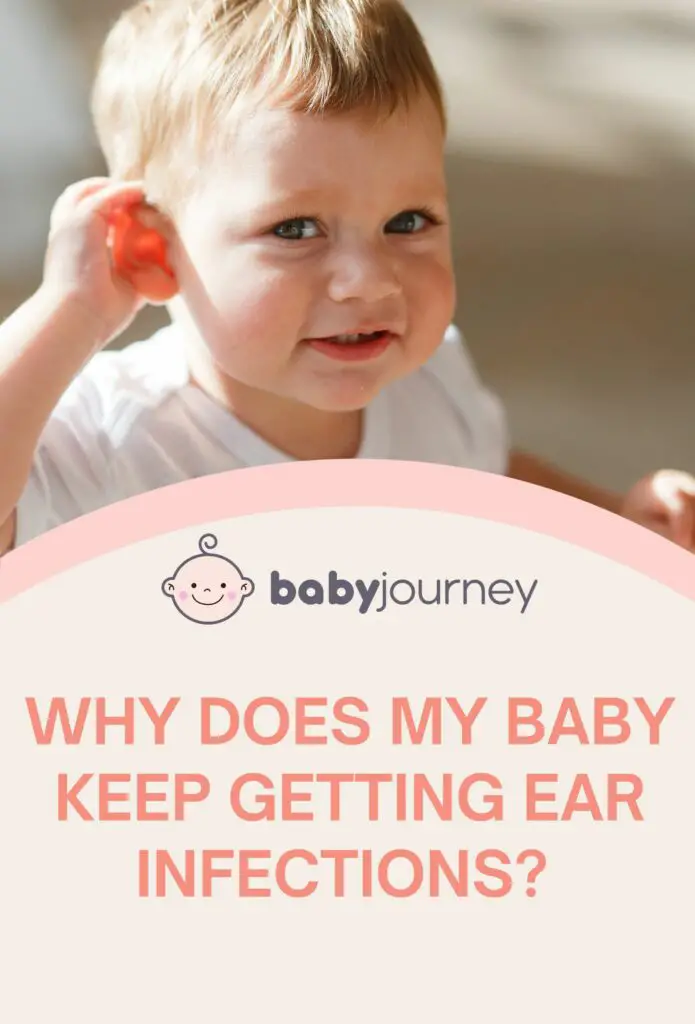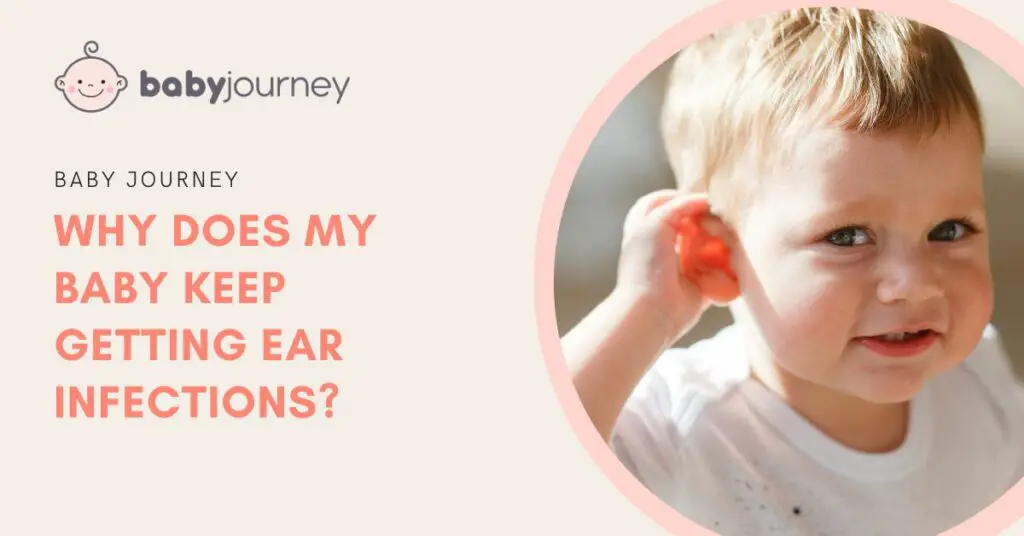Ear infections in babies are a common occurrence that can cause discomfort and distress for both the child and the parents. It is normal for babies and toddlers to experience ear infections, but when they become recurrent, it can be a cause for concern. Parents may wonder why their baby keeps getting ear infections despite their best efforts to prevent them.
Why does my baby keep getting ear infections? There are several reasons why a baby may be more prone to ear infections. One of the most common causes is the anatomy of a baby’s ear. Babies have smaller eustachian tubes, which are responsible for draining fluid from the ear. This makes it easier for fluid to accumulate and become infected. Additionally, babies have weaker immune systems, making them more vulnerable to infections. Other factors that can contribute to ear infections include allergies, exposure to secondhand smoke, and attending daycare.
If a baby is experiencing recurrent ear infections, it is important to seek medical attention. A doctor can determine the underlying cause of the infections and recommend appropriate treatment. In some cases, antibiotics may be necessary to clear up the infection. However, it is also important to take steps to prevent future infections, such as keeping the baby’s ears clean and dry, avoiding exposure to secondhand smoke, and breastfeeding if possible.
- Understanding Ear Infections in Babies
- Diagnosing Ear Infections in Babies
- Treating Ear Infections in Babies
- Preventing Ear Infections in Babies
- Conclusion
- Frequently Asked Questions
- How can I prevent my baby from getting ear infections?
- What are the signs of an ear infection in a newborn?
- What if my baby has multiple ear infections?
- How many ear infections is too many for a child?
- What does chronic ear infections in toddlers treatment involve?
- How can I help my baby with an ear infection sleep?
Understanding Ear Infections in Babies
Why do babies get ear infections? Ear infections are a common ailment that affects many babies and young children. In this section, we will discuss what ear infections are, the risk factors associated with them, and their symptoms.
What are Ear Infections in Babies?
An ear infection, also known as otitis media, is an inflammation of the middle ear caused by bacteria or viruses. In babies, the eustachian tube, which connects the middle ear to the back of the throat, is shorter and more horizontal in orientation than in adults. This makes it easier for fluid to build up in the middle ear, leading to the middle ear infection.
Risk Factors for Ear Infections in Babies
There are several risk factors that increase the likelihood of a baby developing an ear infection. These include:
- Age: Babies between 6 months and 2 years old are more susceptible to ear infections.
- Family history: Babies with a family history of ear infections are more likely to develop them.
- Bottle-feeding: Babies who are bottle-fed are more likely to develop ear infections than breastfed babies.
- Exposure to smoke: Babies who are exposed to cigarette smoke are more likely to develop ear infections.
Symptoms of Ear Infections in Babies
The symptoms of child’s ear infection can vary, but some common signs to look out for include:
- Tugging or pulling at the ear
- Redness or swelling of the ear
- Fever
- Crying or fussiness
- Discomfort or irritability
- Trouble sleeping
- Temporary hearing loss
- Ear drainage
- Bulging eardrum
If you suspect that your baby has an ear infection, it is important to take them to a doctor. The doctor will use a pneumatic otoscope to examine the ear and determine if there is an infection. In some cases, a wait-and-see approach may be recommended as some ear infections can clear up on their own without the need for antibiotics. However, if the infection is severe or does not improve, antibiotics may be prescribed.
In conclusion, ear infections are a common ailment that affects many babies and young children. Understanding the risk factors and symptoms associated with ear infections can help parents identify the condition and seek appropriate medical treatment for their child.
Diagnosing Ear Infections in Babies
Ear infections are common in babies and toddlers, and it’s important to diagnose them early to prevent complications. In this section, we will discuss when to see a doctor, how ear infections in babies are diagnosed, and the possible complications.
When to See a Doctor
If your baby is tugging at their ear, has a sore throat, or has a fever, it’s important to see a doctor.You should also see a doctor if your baby is not sleeping and eating well, or if they seem more fussy than usual. If there is a family history of ear infections, it’s important to be aware of the symptoms and to see a doctor as soon as possible.
How are Ear Infections in Babies Diagnosed?
To diagnose an ear infection in a baby, a doctor or pediatrician will use an otoscope to look inside the ear. If there is fluid behind the eardrum, redness, or swelling, it’s likely that your baby has an ear infection. The doctor may also check your baby’s temperature and look for other signs of infection.
Complications of Ear Infections in Babies
If left untreated, ear infections in babies can lead to complications such as hearing loss, speech delays, and even meningitis. It’s important to see a doctor as soon as possible if you suspect your baby has an ear infection. Treatment may include antibiotics, pain medication, or in some cases, surgery.
In conclusion, if you suspect your baby has an ear infection, it’s important to see a doctor as soon as possible. Early diagnosis and treatment can prevent complications and help your baby feel better.
Treating Ear Infections in Babies
When it comes to treating ear infections in babies, there are a few options available. The best course of action will depend on the severity of the infection, the age of the baby, and other individual factors. In general, treatment will focus on relieving symptoms and preventing complications.
Antibiotics for Ear Infections in Babies
Antibiotics are often prescribed for ear infections in babies. These medications work by killing or stopping the growth of bacteria that may be causing the infection. It is important to note that antibiotics are only effective against bacterial infections, not viral infections.
If a baby has a severe or chronic ear infection, their doctor may prescribe a stronger or longer course of antibiotics. It is important to follow the prescribed dosage and finish the entire course of medication, even if symptoms improve before the medication is finished.
Pain Relief for Ear Infections in Babies
Ear infections can be painful for babies, and it is important to provide relief for their discomfort. Over-the-counter pain relievers such as ibuprofen or acetaminophen can help to reduce pain and fever. It is important to follow the dosing instructions carefully and to consult with a doctor before giving any medication to a baby.
Aspirin should never be given to a baby with an ear infection, as it has been linked to a rare but serious condition called Reye’s syndrome.
Ear Tubes for Ear Infections in Babies
If a baby has recurrent ear infections or chronic fluid buildup in the middle ear, their doctor may recommend ear tubes. Ear tubes are small, cylindrical devices that are surgically placed in the eardrum to promote air flow and equalize pressure. This can help to prevent fluid buildup and reduce the risk of future infections.
Ear tube surgery is a relatively simple and safe procedure, but it does require general anesthesia. Most babies are able to return to normal activities within a day or two after the surgery.
Overall, the best way to prevent ear infections happen in babies is to minimize exposure to secondhand smoke, breastfeed if possible, and make sure the baby is up to date on all recommended vaccines. If a baby does develop an ear infection, prompt treatment can help to prevent complications and reduce discomfort.
Preventing Ear Infections in Babies
Ear infections are common in babies and toddlers, but there are steps parents can take to help prevent them. Here are some tips to help reduce the risk of ear infections in babies:
Prevention Tips for Ear Infections in Babies
- Breastfeeding: Breastfeeding provides important antibodies that can help protect babies from infections, including ear infections. According to the American Academy of Pediatrics, infants should be exclusively breastfed for about 6 months after birth, and breastfeeding should continue along with appropriate complementary foods introduced at around 6 months, for a minimum of 1 year.
- Vaccines: Vaccines can help prevent some of the infections that can lead to ear infections, such as pneumococcal and influenza viruses. Talk to your pediatrician about the recommended vaccine schedule for your baby.
- Formula feeding: If you are not breastfeeding, choose an iron-fortified formula for your baby. Iron helps strengthen the immune system and can help prevent infections.
- Avoid upper respiratory infections: Upper respiratory infections, such as colds, can increase the risk of ear infections. To reduce the risk, try to keep your baby away from people who are sick, wash your hands frequently, and teach your child to cover their mouth and nose when coughing or sneezing.
- Reduce exposure to germs: Keep your baby away from people who are sick, and clean toys and other objects that your baby puts in their mouth.
- Family history: If there is a family history of chronic or recurrent ear infections, talk to your pediatrician about steps you can take to help prevent them.
Vaccines for Ear Infections in Babies
Vaccines can help prevent some of the infections that can lead to ear infections. The pneumococcal conjugate vaccine (PCV13) and the influenza vaccine are two vaccines that can help reduce the risk of ear infections in babies. Talk to your pediatrician about the recommended vaccine schedule for your baby.
Talk to Your Doctor About Ear Infections in Babies
If your baby has chronic or recurrent ear infections, talk to your pediatrician. They may recommend further evaluation or treatment to help prevent complications such as hearing loss. Additionally, if you or anyone in your household smokes, quit smoking or at least avoid smoking around your baby. Secondhand smoke can increase the risk of ear infections.
In summary, there are several steps parents can take to help prevent ear infections in babies. Breastfeeding, vaccines, and reducing exposure to germs are some of the most effective ways to reduce the risk of ear infections. If your baby has chronic or recurrent ear infections, talk to your pediatrician about further evaluation and treatment options.
Conclusion
Ear infections are a common issue among babies and toddlers, and they can be caused by a variety of factors. While some children may be more prone to ear infections due to their anatomy or genetics, there are many steps parents can take to prevent and treat these infections.
First and foremost, it’s important to practice good hygiene to prevent the spread of germs. This includes washing hands regularly and thoroughly, keeping toys and surfaces clean, and avoiding exposure to sick individuals.
Breastfeeding can also help reduce the risk of ear infections in babies, as it helps boost their immune system and provides antibodies that can fight off infections. Additionally, avoiding exposure to cigarette smoke and other irritants can help reduce the risk of ear infections.
When it comes to treatment, antibiotics may be necessary in some cases, but they should not be overused or relied on too heavily. Instead, parents can try home remedies such as using a warm compress, keeping the child’s head elevated, and giving pain relief medication as directed by a doctor.
Overall, while ear infections can be frustrating and uncomfortable for both parents and children, they are a common and treatable condition. By taking steps to prevent and treat ear infections, parents can help keep their little ones healthy and happy.
Frequently Asked Questions
How can I prevent my baby from getting ear infections?
There are several ways to reduce the risk of ear infections happen in babies. One of the most important things parents can do is to make sure their baby is up-to-date with their vaccinations. Breastfeeding can also help protect babies from ear infections, as breast milk contains antibodies that help fight off infection. It’s also important to keep your baby away from people who are sick, and to wash your hands and your baby’s hands frequently.
What are the signs of an ear infection in a newborn?
Newborns may not show the same signs of an ear infection as older babies or children. Signs to look out for include fussiness, feeding difficulties, and a fever. If you suspect your newborn has an ear infection, it’s important to contact your pediatrician immediately.
What if my baby has multiple ear infections?
If your baby has multiple ear infections, it’s important to talk to your pediatrician about possible underlying causes. Your doctor may recommend further testing or refer you to an ear, nose, and throat specialist.
How many ear infections is too many for a child?
There is no set number of ear infections that is considered too many for a child. However, if your child is experiencing frequent ear infections, it’s important to talk to your pediatrician about possible underlying causes and treatment options.
What does chronic ear infections in toddlers treatment involve?
Treatment for chronic ear infections in toddlers may involve antibiotics, ear drops, or surgery. Your pediatrician or an ear, nose, and throat specialist can help determine the best course of treatment for your child.
How can I help my baby with an ear infection sleep?
Elevating your baby’s head while they sleep can help reduce pressure and ease pain associated with ear infections. You can also try using a warm compress on the affected ear or giving your baby pain relievers as directed by your pediatrician. It’s important to follow your doctor’s instructions and not give your baby any medication without consulting with them first.




